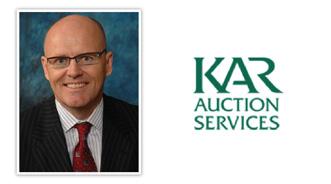KAR Highlights Another Strong Year by Insurance Auto Auctions & AFC

By subscribing, you agree to receive communications from Auto Remarketing and our partners in accordance with our Privacy Policy. We may share your information with select partners and sponsors who may contact you about their products and services. You may unsubscribe at any time.
CARMEL, Ind. –
KAR Auction Services once again cheered the financial performance of two subsidiaries — Insurance Auto Auctions and Automotive Finance Corp.
Chief executive officer Jim Hallett declared both operations had “outstanding” years as they both posted rises in profit and revenue of at least 15 percent.
Looking first at Insurance Auto Auctions, its 2011 revenue increased $89.7 million or 15 percent to $700.1 million as compared with its 2010 figure of $610.4 million.
As a result, the company determined its full-year gross profit climbed $36.4 million or 15 percent to $284.8 million, up from $248.4 million a year earlier.
IAA added the gross margin percent for both years was unchanged at 40.7 percent.
Executives indicated the increases in revenue and gross profit came as a result of several factors, including an increase in vehicles sold of approximately 9 percent for the year, as well as an increase in fee revenue per unit due to an increase in average selling price for vehicles sold.
Subscribe to Auto Remarketing to stay informed and stay ahead.
By subscribing, you agree to receive communications from Auto Remarketing and our partners in accordance with our Privacy Policy. We may share your information with select partners and sponsors who may contact you about their products and services. You may unsubscribe at any time.
Additionally, IAA mentioned an increase in purchased vehicles sold — in which the entire selling price of the vehicle is recorded as revenue — also contributed to the growth in revenue and revenue per vehicle sold.
Insurance Auto Auctions acknowledged its 2011 selling, general and administrative expense increased $3.4 million or 4 percent to $82.3 million as compared with $78.9 million in 2010.
Executives explained the increase is attributable to increases in compensation expense, incentive-based compensation expense and professional fees related to information technology and marketing initiatives, partially offset by decreases in stock-based compensation expense, professional fees related to process improvement initiatives and severance costs.
“Insurance Auto Auctions had an outstanding year,” Hallett reiterated. “When you think about the things that effect volume and growth at Insurance Auto Auctions, a couple of things I would point out. I believe Insurance Auto Auctions will continue to grow but potentially at lower levels than we’ve experienced in the past two years.
“This mild weather we’re experiencing may lead to fewer claims,” he conceded. “Although this will be a concern for Insurance Auto Auctions, it’s been very positive for ADESA. In fact, at ADESA, we have had no cancelled sales to date. I believe that’s the first time I can remember saying that as we approach March 1 in any year.
“It lowers our labor cost across the board as we’re not pushing snow around,” Hallett went on to mention. “It makes for happier employees and it makes it much more conducive for our customers to want to come and see you on a regular basis.
“As fuel prices continue to rise and approach that $4 level, we may see less miles driven which could result in lower claims again,” Hallett went on to note.
Hallett also touched on one other point about IAA.
“As you all know, Insurance Auto Auctions wins and loses business from time to time,” Hallett told investment analysts this week. “Recently Insurance Auto Auctions was on the losing end of a national RFP, which was unfortunate but will not be material to our results and the impact of this is reflected in our guidance.”
AFC Performance
Moving over to how AFC fared, the company tabulated that its 2011 revenue increased $32.5 million or 24 percent to $168.8 million as compared with $136.3 million in 2010.
That figure allowed AFC to generate gross profit in 2011 of $131.2 million, which was $29.0 million or 28 higher than the 2010 total of $102.2 million.
AFC’s gross margin also ticked higher in 2011, edging up to 78 percent from 75 percent.
Executives explained the increases in revenue and gross profit were primarily a result of a 9-percent climb in revenue per loan transaction and a 14-percent increase in loan transaction units.
The increase in revenue per loan transaction was primarily a result of a decrease in credit losses and related provision, increases in the average portfolio duration and average loan value and higher floor plan and other fee income.
Furthermore, AFC mentioned its 2011 selling, general and administrative expenses increased $1.5 million to $22.1 million, primarily as a result of increases in compensation expense, travel costs and postage and promotion expenses, partially offset by decreases in professional fees and incentive compensation.
“AFC also had another great year,” Hallett stated. “I would point out that we did this all while maintaining a portfolio that was 99 percent current for the entire 2011 year.”
Analysts also asked Hallett about his reaction to Manheim revealing the purchase of Dealer Services Corp. of Indiana in late January, developments Auto Remarketing initially reported here and shared executive reaction here.
“I would say DSC has been a competitor with AFC. We’ve competed with them in the past, and will continue to compete with them in the future,” Hallett responded. “I don’t know exactly where their goals are. They’d have to speak to that. But anecdotally I hear that they’re going to continue to run them as two independent businesses. We’ll continue to compete the same we have the past several years.”
Editor’s Note: Earlier this week, AR Today included KAR’s overall financial performance recap here, as well as discussion on ADESA’s 2011 performance and integration with OPENLANE here.


